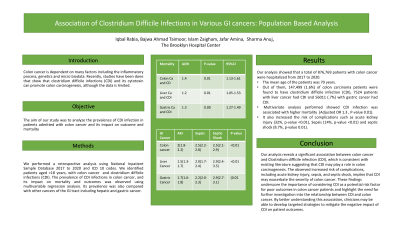Tuesday Poster Session
Category: Colon
P3644 - Association of Clostridioides difficile Infections in Colon cancer; A Population Based Analysis
Tuesday, October 29, 2024
10:30 AM - 4:00 PM ET
Location: Exhibit Hall E

Has Audio
- RI
Rabia Iqbal, MBBS
Brooklyn Hospital Center
Brooklyn, NY
Presenting Author(s)
Rabia Iqbal, MBBS1, Ahmad Taimoor Bajwa, MBBS1, Zaigham ul Islam, MBBS2, Amina Jafar, MBBS3
1Brooklyn Hospital Center, Brooklyn, NY; 2Nishtar Medical University, Rajanpur, Punjab, Pakistan; 3Shaukat Khanum Memorial Cancer Hospital & Research Centre, Lahore, Punjab, Pakistan
Introduction: Colon cancer is dependent on many factors including the inflammatory process, genetics and microbiota. Recently, studies have been done that show that Clostridioides difficile infections (CDI) and its cytotoxin can promote colon carcinogenesis, although the data is limited. The aim of our study was to analyze the prevalence of CDI infection in patients admitted with colon cancer and its impact on outcome and mortality.
Methods: We performed a retrospective analysis using National Inpatient Sample Database 2017 to 2020 and International Classification of Diseases, Tenth Revision codes. We identified patients aged >18 years, with colon cancer and Clostridioides difficile infections (CDI). The prevalence of CDI infections in colon cancer, and its impact on mortality and outcomes was observed using multivariable regression analysis. We also compared the prevalence and outcomes of CDI infection in colon cancer patients with that of patients with other gastrointestinal tract cancers, including hepatic and gastric cancer.
Results: Our analysis examined 876,769 patients hospitalized with colon cancer from 2017 to 2020, with a mean age of 70 years. Among these patients, 140,280 (1.6%) were found to have Clostridioides difficile infections (CDI). Multivariate analysis showed that CDI was associated with higher mortality compared to those without CDI (6.5% vs. 4.9%; Adjusted OR 1.4, P-value 0.01). Additionally, CDI increased the risk of complications, including acute kidney injury (32% vs. 18%, P-value < 0.01), sepsis (14% vs. 6%, P-value < 0.01), and septic shock (8.7% vs. 3.5%, P-value 0.01). The table below compares the prevalence and impact of CDI on outcomes in colon cancer patients with those in other gastrointestinal cancers.
Discussion: Our analysis reveals a significant association between colon cancer and Clostridioides difficile infections (CDI), which is consistent with existing literature suggesting that CDI may play a role in colon carcinogenesis. The increased risk of complications observed in our study suggests that CDI may contribute to the development of more severe disease in these patients. These findings highlight the importance of considering CDI as a potential risk factor for poor outcomes in colon cancer patients and suggest that further research is needed to understand the relationship.
Note: The table for this abstract can be viewed in the ePoster Gallery section of the ACG 2024 ePoster Site or in The American Journal of Gastroenterology's abstract supplement issue, both of which will be available starting October 27, 2024.
Disclosures:
Rabia Iqbal, MBBS1, Ahmad Taimoor Bajwa, MBBS1, Zaigham ul Islam, MBBS2, Amina Jafar, MBBS3. P3644 - Association of <i>Clostridioides difficile</i> Infections in Colon cancer; A Population Based Analysis, ACG 2024 Annual Scientific Meeting Abstracts. Philadelphia, PA: American College of Gastroenterology.
1Brooklyn Hospital Center, Brooklyn, NY; 2Nishtar Medical University, Rajanpur, Punjab, Pakistan; 3Shaukat Khanum Memorial Cancer Hospital & Research Centre, Lahore, Punjab, Pakistan
Introduction: Colon cancer is dependent on many factors including the inflammatory process, genetics and microbiota. Recently, studies have been done that show that Clostridioides difficile infections (CDI) and its cytotoxin can promote colon carcinogenesis, although the data is limited. The aim of our study was to analyze the prevalence of CDI infection in patients admitted with colon cancer and its impact on outcome and mortality.
Methods: We performed a retrospective analysis using National Inpatient Sample Database 2017 to 2020 and International Classification of Diseases, Tenth Revision codes. We identified patients aged >18 years, with colon cancer and Clostridioides difficile infections (CDI). The prevalence of CDI infections in colon cancer, and its impact on mortality and outcomes was observed using multivariable regression analysis. We also compared the prevalence and outcomes of CDI infection in colon cancer patients with that of patients with other gastrointestinal tract cancers, including hepatic and gastric cancer.
Results: Our analysis examined 876,769 patients hospitalized with colon cancer from 2017 to 2020, with a mean age of 70 years. Among these patients, 140,280 (1.6%) were found to have Clostridioides difficile infections (CDI). Multivariate analysis showed that CDI was associated with higher mortality compared to those without CDI (6.5% vs. 4.9%; Adjusted OR 1.4, P-value 0.01). Additionally, CDI increased the risk of complications, including acute kidney injury (32% vs. 18%, P-value < 0.01), sepsis (14% vs. 6%, P-value < 0.01), and septic shock (8.7% vs. 3.5%, P-value 0.01). The table below compares the prevalence and impact of CDI on outcomes in colon cancer patients with those in other gastrointestinal cancers.
Discussion: Our analysis reveals a significant association between colon cancer and Clostridioides difficile infections (CDI), which is consistent with existing literature suggesting that CDI may play a role in colon carcinogenesis. The increased risk of complications observed in our study suggests that CDI may contribute to the development of more severe disease in these patients. These findings highlight the importance of considering CDI as a potential risk factor for poor outcomes in colon cancer patients and suggest that further research is needed to understand the relationship.
Note: The table for this abstract can be viewed in the ePoster Gallery section of the ACG 2024 ePoster Site or in The American Journal of Gastroenterology's abstract supplement issue, both of which will be available starting October 27, 2024.
Disclosures:
Rabia Iqbal indicated no relevant financial relationships.
Ahmad Taimoor Bajwa indicated no relevant financial relationships.
Zaigham ul Islam indicated no relevant financial relationships.
Amina Jafar indicated no relevant financial relationships.
Rabia Iqbal, MBBS1, Ahmad Taimoor Bajwa, MBBS1, Zaigham ul Islam, MBBS2, Amina Jafar, MBBS3. P3644 - Association of <i>Clostridioides difficile</i> Infections in Colon cancer; A Population Based Analysis, ACG 2024 Annual Scientific Meeting Abstracts. Philadelphia, PA: American College of Gastroenterology.
